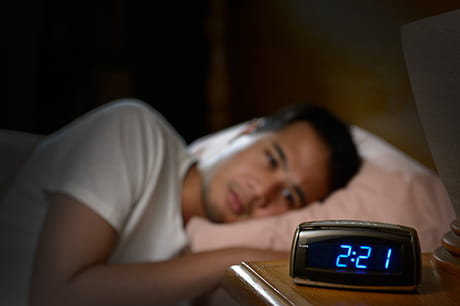Know the difference: Is it insomnia or just a few nights of bad sleep?
Don’t sleep on these insomnia symptoms
If you’re having a night when you’re nervous, angry, upset or stressed, sleep may not come easily. You may notice that you lie awake in bed for a while or wake up periodically throughout the night.
A lack of sleep has significant effects on your daily life, too. It can make you more irritable, less coordinated and more anxious. Plus, it can put you at a greater risk for accidents and injuries.
“If you notice that you’re having trouble sleeping, don’t write it off,” said Michael C. Marino, D.O., medical director of Geisinger Sleep Labs. “Sleep deprivation can cause a sleep debt that only gets worse with each passing day. This can increase your risk for heart disease and diabetes, so it’s important to talk to your doctor if you have consistent sleep problems.”
Is it insomnia?
Insomnia is the inability to fall and stay asleep, even when you should otherwise be able to do so. It’s estimated that between 30 and 40 percent of Americans suffer from insomnia each year. Insomnia can either be chronic or acute, depending on its duration and frequency. It can cause fatigue, mood disturbances, low energy levels and difficulty concentrating.
“Acute insomnia tends to happen because of high stress levels in the body,” said Dr. Marino. “Whether it’s a big test, a job interview or a breakup, acute insomnia can last for a week or more. On the other hand, chronic insomnia is defined as three or more nights of disrupted sleep a week over the course of three or more months. While acute insomnia will often go away on its own, it can still have dangerous effects. If you have chronic insomnia, there are steps you can take to try and lessen your symptoms.”
Ways to get rid of insomnia
For most people, the best ways to beat insomnia are to decrease caffeine intake, stop drinking alcohol, reduce stress levels, get new bedding and limit the use of electronics before bed.
“A good routine to promote sleep is to get a shower before bed and then take 30 minutes to relax and read or do another non-strenuous and non-electronic activity,” said Dr. Marino. “Make sure to go to bed and wake up at the same time every day to keep your circadian rhythm consistent. Allergy medications can help you fall asleep, but shouldn’t rely on those.”
For people with chronic insomnia, if these strategies don’t work, talk to your doctor. They can conduct a sleep study to measure how you’re sleeping and diagnose the cause of your insomnia. They can also prescribe sleep aid medications to help you get a good night’s rest.
In a sleep study, a doctor connects you to analytical equipment while you sleep. This lets a team of specialized physicians analyze your sleep cycle for irregularities. Typically, a sleep study clinic will allow you to schedule your sleep study during the time when you’d normally sleep.
“The best way to uncover why you’re having difficulty falling or staying asleep is to assess what’s happening during a sleep study and develop a treatment based on what we find,” said Dr. Marino.
Dr. Michael Marino, DO, is a sleep medicine specialist in Bloomsburg. To schedule an appointment, please call 800-275-6401.

